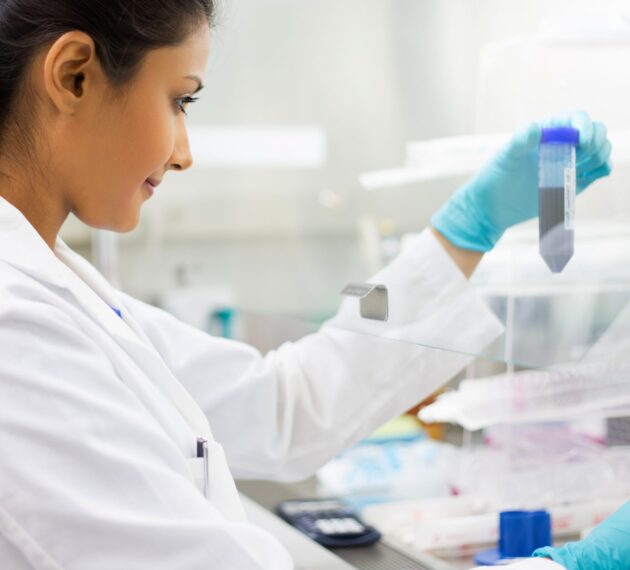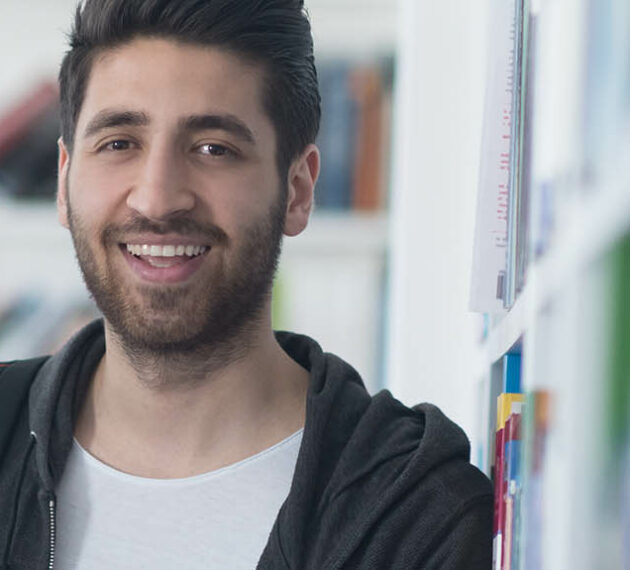
Discover our
Master’s degree in Biobank Management
Prerequisites
Validated Bac + 3 level diploma in Life Sciences (or equivalent).
This Master is suitable for students who like Biology and Life Sciences but do not wish to specialize in a specific field or go into research.
Management and biology
The Master makes it possible to develop a dual skill in management and biology, for positions of responsibility in biobanks.
Biobanks are the infrastructures that organize biological resources (DNA, cells, microbial strains, etc.) from collection to availability for the scientific community. These infrastructures are essential for advances in research but also in bio-industries or in the field of biodiversity.
The Master prepares for professions of responsibility in these structures, with an asserted international dimension and a marked multidisciplinary character: scientific expert, the manager of biobanks is capable of piloting projects and managing a team and a budget. He knows the legislation and ethics applicable to biobanks, he is also able to communicate with the scientific community and to seek partnerships.
Full name of the diploma
« Manager de biobanques »
Level 7 professional certification (= Master’s level), state-certified and registered in the RNCP (National Directory of Professional Certifications). Registered under RNCP No. 36226.
The Master is organized in 4 semesters over two years, comprising a total of 11 months in a company (internship or work-study program).
It makes it possible to capitalize 120 ECTS credits. During the first semester, 3 teaching units (12 ECTS credits) are taken at Claude Bernard Lyon1 University.
The teaching units
- Bioresources and data: 30%
- Business environment: 30%
- Managerial skills: 30%
- Humanities, sciences and society: 10%
- Traineeship :
- Year 4: 4 months in business
- Year 5: 6-month internship
12 months internship in a company
The first internship takes place during the M1 after only two months of training: it is indeed a biobank discovery internship.
Students are immersed for 2 months in a biobank to discover how it works. The continuation of the courses of M1 will thus be more concrete for them, and more profitable.
The other three internships are distributed until the end of the M2, one internship per semester, for a total of 6 months of internship per year.
These successive internships can be carried out in the same biobank, for a long-term mission, or in different biobanks to vary the experiences.
The dual competence Biology – Management
It makes it possible to develop strong managerial and transversal skills in two years, in addition to scientific contributions in the field of sample sciences. At the end of the Master, the graduate can thus ensure both scientific and technical missions, but also more transversal missions: coordinating the technical and scientific aspects of a biobank, managing the data associated with the samples, developing a system of Quality Management, transfer of technologies and propose technological innovations, manage a team, a budget, projects, an organization, communicate, integrate the biobank in the networks of international experts, apply legislation, ethics and rules of ethics relating to biobanks.
First Master in France in this field
Biobanks have been in full structuring and professionalization for about 10 years.
This development has brought about a new profession, that of managing biobanks. The Master Management of Biobanks was thus created at ESTBB in 2010 to meet the needs of professionals in the sector, it is therefore the first training in France preparing for these specific professions. This ensures rapid professional integration upon leaving the Master.
A Master linked with research
At the Master level, the link with fundamental or applied research is very important, to guarantee excellence in teaching and its immediate updating. The Master Management of Biobanks thus relies on a research team within the Faculty of Sciences, which works on the etiology of liver cancers. This team is led by Pr. Emmanuelle Gormally, who is also the teaching director of the Master.
A big international dimension
- Lessons in French and English
- Conferences of recognized international experts in their field
- Educational unit straddling the two years presenting the integration of biobanks in the scientific
- community, with the discovery of national and international networks of biobanks
- Possibility of doing an internship in a biobank abroad.
Professional speakers
The lessons of the master management of biobanks are 86% provided by professional speakers. This guarantees teaching as close as possible to needs in laboratories and companies. It is also a good way for students to start their professional network, by staying in contact with these stakeholders during and after the training.
Master available in work-study program
Both years can be completed alternately, under an apprenticeship contract (M2 only) or professionalization (M1 and M2), subject to having found a host company or biobank.
The alternation rate is around 2 months in training / 2 months in business.
This rhythm is adapted to the Master level of the missions entrusted: the student is ready for a prolonged immersion in a company for complete management of certain files over time.
The contract is remunerated by the host company 61 to 85% of the minimum wage, and it is the company which pays the tuition fees.
The advantages of the work-study program:
- a real first professional experience,
- dual student-employee status,
- a salary received for approximately one year, for an amount of approximately 8,600 to 11,000 euros in total
- full support for tuition fees by the host company
The work-study program allows you to follow fully paid training.
Master disponible en alternance
Les deux années du cursus peuvent être réalisées en alternance, sous contrat d’apprentissage (M2 seulement) ou de professionnalisation (M1 et M2), sous réserve d’avoir trouvé une entreprise ou une biobanque d’accueil.
Le rythme de l’alternance est d’environ 2 mois en formation / 2 mois en entreprise.
Ce rythme est adapté au niveau Master des missions confiées : l’étudiant est prêt à une immersion prolongée en entreprise pour une prise en charge complète de certains dossiers sur la durée.
Le contrat est rémunéré par l’entreprise d’accueil 61 à 85 % du SMIC, et c’est l’entreprise qui paie les frais de scolarité.
Les avantages de l’alternance :
- une vraie première expérience professionnelle,
- le double statut étudiant-salarié,
- un salaire perçu pendant un an environ, pour un montant d’environ 8 600 à 11 000 euros au total
- la prise en charge totale des frais de scolarité par l’entreprise d’accueil
Employment of graduates
80% find a job upon leaving
15% find a job within 3 months of leaving
5% find a job within 6 months of leaving
Discover
The news of
l'ESTBB
Our other trainings



